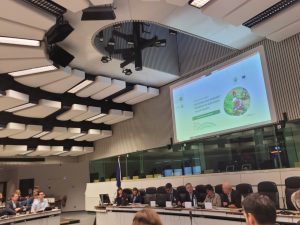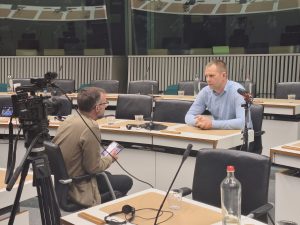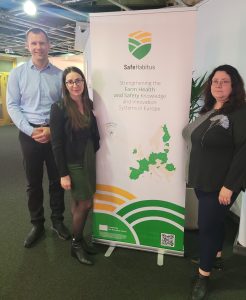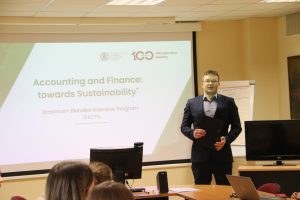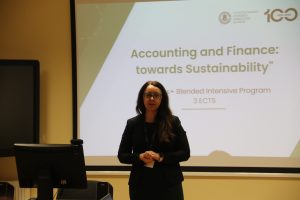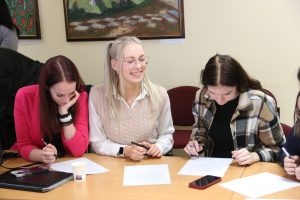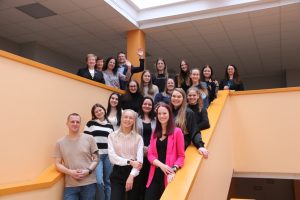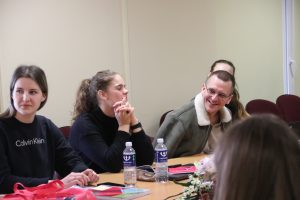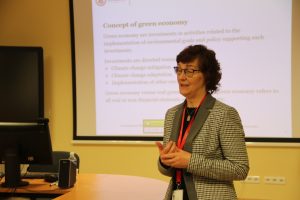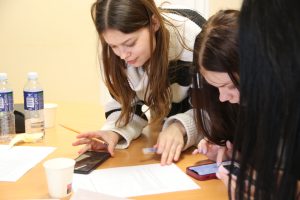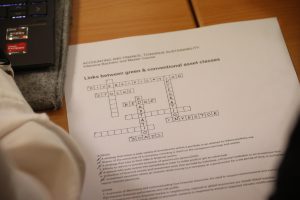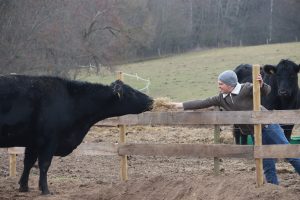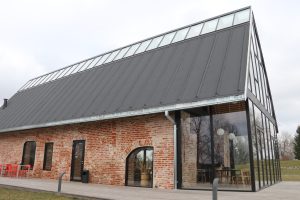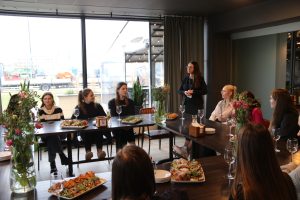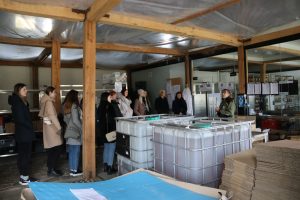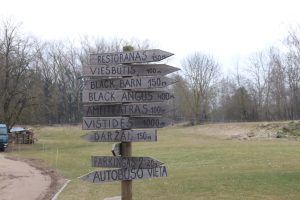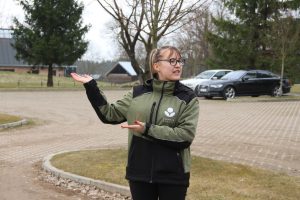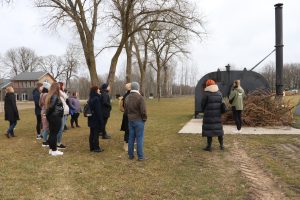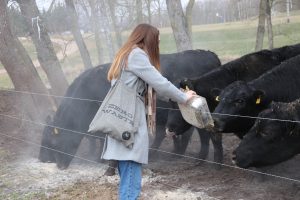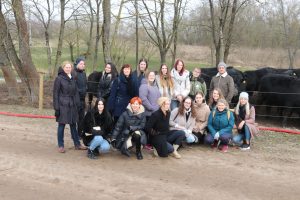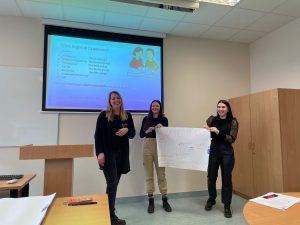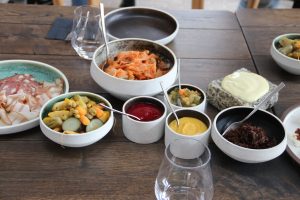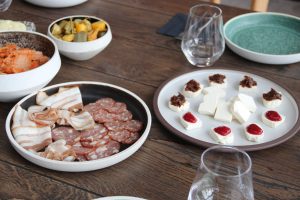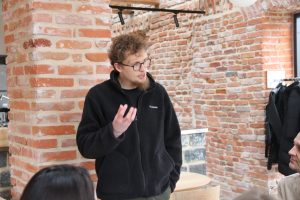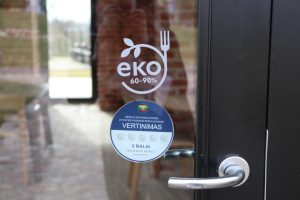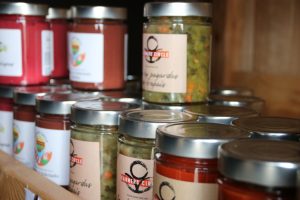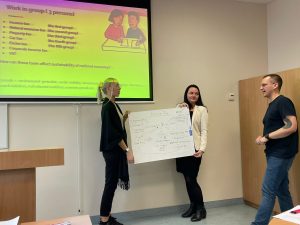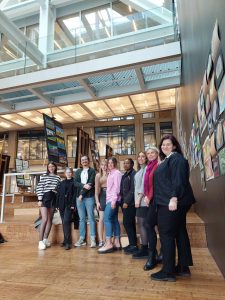SEMINAR Innovative research in agriculture and environmental engineering for the bioeconomy development
The Bioeconomy Research Center of Excellence (BioTEC) of the Academy of Agriculture of the Vytautas Magnus University invites teachers, researchers, doctoral students and students to participate in the seminar: Innovative research in agriculture and environmental engineering for the bioeconomy development.
Date: 2024 May 9 1:00 p.m. to 4:00 p.m.
Join the pre-seminar remotely HERE
VMU Agriculture Academy 100 years anniversary celebration. You are welcome to one day festival!
This year, Vytautas Magnus University (VMU) Agriculture Academy is celebrating its 100 years anniversary. We kindly invite all members, alumni, and friends on May 18 to participate in the 100th years anniversary celebration. It is a one day festival that will take place in nature, in the VMU Agriculture Academy park in front of the Central building. There will be plenty of dancing, music and laughter!
We aim to create a celebration where every participant will find a place. The guests of the event will be delighted by the performances of children’s, students’ and senior national dance groups, the “Subtilus” group, and the whole day’s festival will be crowned by the festive concert of the famous lithuanian singer Mantas Jankavičiaus! In addition to amazing performances on stage, festival participants will also have other entertainment – the celebration will start with the 100th anniversary run-walk, there will be an area for children’s entertainment, a rest area for students, alumni and graduates of the Academy are invited to register for the Green Dinner. Event participants will also be invited to visit the representative area of VMU Agriculture Academy faculties and the sports /entertainment area, where one can get a prize!
Registration for the festive VMU Agriculture Academy 100th anniversary walk-run
A 1,924-meter-long walking-running track on the academic campus is dedicated to the 100th anniversary of the VMU Agriculture Academy. The first 100 registered participants will receive a historic running shirt!
Registration for the Green Dinner
We invite you to meet your group / coursemates and register for the Green Dinner, where participants will have the opportunity to share memories and chat. In the registration form, please indicate your contacts and how many people from your group plan to come, and the event organizers will take care of ordering a table where you will have the opportunity to bring food, communicate and listen to the concert. Registration is open until May 10.
Registration for the excursions
We invite you to visit the premises of VDU ŽŪA and take part in a tour of the most interesting places of VDU ŽŪA! In the registration form, please indicate your contacts and which faculties and auditoriums you would like to visit during the event. The program and time of the VDU ŽŪA excursion will be indicated in the near future. All information will be provided by e-mail to those who have registered. by post Registration is open until May 10.
Logistics and Commerce students visited UAB “Tomegris”
The students of the Logistics and Commerce study program of the Bioeconomy Development Faculty of the Vytautas Magnus University (VMU) Agriculture Academy visited UAB “Tomegris”. The main specialization of the company is the organization and implementation of oversized cargo transportation. Students were introduced to the challenges and opportunities of logistics activities, modern trends and company changes during the company’s lifetime.
Students were also presented with opportunities to apply for internships and work positions.
The meeting and tour of the company was led by Inga Sušinskienė, UAB “Tomegris” personnel manager. It was organized by the lecturers of the Bioeconomy Development Faculty of VMU Agriculture Academy Lect. Dr. Mindaugas Samuolaitis and Assoc. Prof. Dr. Milita Vienažindienė.
VMU AA Autumn Intake 2024/2025 is open (extended application deadline). Apply now!
Would like to gain strong knowledge, solid skills, and invaluable international experience? Thinking about an unforgettable European student adventure and traveling the world?
Top-quality studies in a high-ranking university and living in Kaunas – located in the center of Europe – may be the perfect combination for You.
Your lifetime adventure can start now. With VMU Agriculture Academy.
Autumn Intake 2024/2025 study programmes:
- Accounting and Finance / Учет и Финансы (BA)
- Sustainable Bio-Business Management (BA)
- Logistics and Commerce (BA)
- Business Logistics (MA)
- Customs Process Management (MBA, online)
- Ecology and Climate Change (MA)
Application deadlines:
June 1: For applicants from non-EU/EFTA countries (excluding countries listed below)
July 1: For applicants from EU/EFTA countries and citizens of visa-free countries including Albania, Argentina, Australia, Brazil, Canada, Sakartvelo, Israel, Japan, Malaysia, Moldova, Mexico, New Zealand, Singapore, South Korea, United Kingdom, United States, Ukraine, Venezuela.
Information about Application and Admission Procedures
Information about Scholarships
Contact person: VMU Agriculture Academy International Coordinator Ekaterina Makrickiene ekaterina.makrickiene@vdu.lt +370 37 752 386
More information about VMU Agriculture Academy study programmes
THE 3RD MEETING OF SAFEHABITUS PROJECT PARTNERS AND PARTICIPATION IN THE SAFEHABITUS POLICY SEMINAR – “SEASONAL AND MIGRANT WORKERS IN AGRI-FOOD VALUE CHAINS”
Researchers Dr. Laura Girdžiūtė, Dr. Anastasija Novikova and Dr. Gediminas Vasiliauskas from Vytautas Magnus University’s Agriculture Academy participated in the third SafeHabitus project’s meeting and SafeHabitus Policy Seminar – “Seasonal and migrant workers in agri-food value chains” from April 9 to 11, 2024.
Safehabitus seminar gathered more than 50 representatives from different European Union countries and institutions who shared their experience and knowledge about the relevant questions regarding the work in agriculture.
The aim of this seminar was to develop a strategic approach to address these challenges in a systematic and forward-looking way involving both policymakers and stakeholders at the EU level and to share the outcomes of the seminar with the EU agri-food Strategic Dialogue.
This Policy Workshop also was dedicated to synthesize the latest and most relevant scientific research and practical insights from a wide variety of stakeholders. It facilitated debate and sharing of perspectives among those actors and European policymakers directly involved on issues related to labour standards and living and working conditions of migrant and seasonal workers. By gathering the latest evidence, we seek to provide policymakers with the knowledge and evidence needed to drive positive change.
The policy seminar was part of a series of policy seminars designed to foster collaboration and knowledge-sharing among policy makers, stakeholders, practitioners, and researchers. It has been organised by SafeHabitus consortium members IAMZ CIHEAM, TEAGASC, GEOPA, CEJA and AEIDL.
Erasmus+ Blended Intensive Programme for undergraduate and postgraduate students “ACCOUNTING AND FINANCE: TOWARDS SUSTAINABILITY”
On 18-22 March 2024, the Faculty of Bioeconomy Development of Vytautas Magnus University organised an intensive training course for foreign students under the Erasmus+ Blended Intensive Programme (BIP) “Accounting and Finance: towards Sustainability”.
The aim of this training was to deepen and broaden students’ specialised knowledge in the areas of corporate social responsibility and sustainability, environmental management accounting, sustainable financing, and to develop students’ competence in assessing financial aspects of sustainability.
The training was attended by 16 students from the Latvian University of Life Sciences and Technology and Estonian University of Life Sciences.
During the intensive training, students learned what role green finance plays in greening the economy and what is the relationship between corporate social responsibility and the cost of capital, which is characteristic of green bonds. The teachers introduced them to which companies must prepare sustainability reports, what requirements are imposed on them, and based on which criteria they must be analyzed and evaluated. During the training, students discussed the topic of green accounting, learned to identify environmental costs, plan and evaluate them, learned what role taxes play in promoting the sustainability of the country’s economy, as well as the impact of agro-environmental subsidies on ecological efficiency.
The participants not only had the opportunity to discuss these and similar topics during the lectures, but at the end of the training they could present their point of view and the results of the group work on the topics suggested by the teachers.
The program was taught by 4 teachers from the Faculty of Bioeconomy Development of VMU Agricultural Academy – prof. dr. Vilija Aleknevičienė, assoc.prof. dr. Erika Besusparienė, lect. Asta Bendoraitytė and lect. Kristina Gesevičienė, as well as 3 teachers from Erasmus+ partner universities – lect. dr. Alona Irmeja and lect. Laila Kelmere from the Latvian University of Life Sciences and Technologies and lect. dr. Maire Nurmet from the University of Tartu.
An important part of these intensive studies was acquainting participants with examples of the best practices. During the intensive training week, the participants of the program went on an educational excursion to the 700 ha farm “Farmers circle”. Here, the training participants were introduced to the principles of sustainable business practiced on the farm: “Farmers circle” sells the produce grown at farmers’ markets, and the farm operates a restaurant with seasonal dishes made from local products. During the farm tour and local tastings of the local products, students had the opportunity to get a closer look at examples of sustainable use of resources, organizational structure of sustainable business and the practical application of sustainability ideas.
This Erasmus+ BIP program was coordinated by associate professor of the Department of Applied Economics, Finance and Accounting dr. Dalia Juočiūnienė and the international coordinator of the VMU Agricultural Academy dr. Monika Medikienė.
14th international scientific conference “Accounting and Finance for Business 2024: Towards Sustainability”
Traditionally, an accounting and finance conference is organised every two years at the Faculty of Bioeconomy Development of the Vytautas Magnus University Agriculture Academy (VMU AA). The 14th international scientific conference “Accounting and Finance for Business 2024: Towards Sustainability” will be organised in the year of the 100th anniversary of the VMU Agriculture Academy.
The role of the VMU Agriculture Academy in promoting sustainability is irreplaceable and fundamental. The relationship between the VMU Agriculture Academy and sustainability is very important and relevant because the agricultural sector has been directly related to many aspects of sustainability, therefore since 1924. Since the establishment of the Agriculture Academy, accounting and financial studies have been carried out, as well as research contributing to the sustainable development of the agricultural sector. These efforts have become important steps towards the sustainability of the agricultural sector, and as we continue to develop the topic of sustainability, we continue the scientific and practical discussions about the importance of accounting and finance in all organisations.
Today, as society becomes more concerned with issues such as climate change, social responsibility, and sustainability, accounting and finance are becoming increasingly important. But what exactly does sustainability mean in these areas? And why is it becoming such a critical issue? We invite you to join us on 14-15 November 2024 at the 14th international scientific conference “Accounting and Finance for Business 2024: Towards Sustainability”, so that we can search for answers together. The Accounting and Finance Conference will be organised remotely. The conference will be held in English.
Sustainability is one of the biggest challenges facing companies and organisations today. It means responsibility not only to shareholders, but also to society and the environment. As climate change, social responsibility, and other environmental issues become more relevant to accounting and finance, accounting and finance must become part of this sustainability movement.
Sustainability accounting and finance enables organisations to measure the social and environmental benefits they deliver. This includes not only economic aspects, but also social and environmental impacts. This is an integral part of sustainability. We believe that accounting and finance can and must contribute to business coherence and sustainable development. It is not only science but also practice that has an increasingly important role to play.
On the second day of the conference, the panel presentations and discussion session “Linking sustainability policy to future finance and accounting” will be held, where we hope to find many important answers.
Early registration is now open for participants until 3 June 2024. A reduced participation fee will apply to those who wish to make an oral message or submit a pre-recorded presentation message by 3 June 2024. Registration for presenters will open until 7 October 2024, and for listeners until 7 November 2024. There is no fee for listeners.
More information about the 14th international scientific conference “Accounting and Finance for Business 2024: Towards Sustainability” and key deadlines available on the conference website https://afk.vdu.lt/
Join us at the 2024 Conference and contribute to important discussions that can change the world of business!
The Organising Committee of the International Scientific Conference “Accounting and Finance for Business 2024: Towards Sustainability”
New knowledge and experienced skills in ERASMUS BIP courses “Sustainability Pressure Cooker” at Rotterdam University of Applied Sciences
During 11–15 March, lecturers of the Faculty of Bioeconomy Development, prof. dr. V. Atkočiūnienė and assoc. prof. dr. G. Vaznonienė, and 7 faculty students (4 bachelor students and 3 master students) participated in ERASMUS BIP intensive courses designed to promote and strengthen the digital inclusion of various social groups in the city of Rotterdam by applying the principles of sustainability.
Representatives of the Faculty of Bioeconomy Development had the opportunity to attend lectures and participate in practical sessions related to the application of digital tools to increase the attractiveness of the area. Rotterdam Business School teachers, led by S. Buivys, collaborating together with representatives of the Rotterdam municipality, prepared tasks for the students for the whole week. Teachers and colleagues from Germany, New Zealand, and the Netherlands discussed the use of artificial intelligence in the study process and organising internships; they exchanged experience on how to activate students to participate in the activities of young scientists.
The students who participated in the course were divided into 11 groups and conducted field research in districts of Rotterdam city, prepared group presentations and posters, and on the last day, they made presentations according to the requirements of Pecha-Kucha presentations to a committee consisting of 3 teachers and 3 representatives of the municipality of Rotterdam and participated in question-and-answer sessions. Three groups of students who succeeded in clearly conveying the results of their research were declared winners.
MBA in Customs Process Management – to move up the career ladder with confidence
The ability to manage customs processes with confidence and professionalism is particularly important for those seeking to work in international companies with trade-related business operations. The sector is characterised by career opportunities and motivating salaries. Moreover, there is a shortage of highly skilled professionals and managers in the labour market. The MBA study programme “Customs Process Management” at the VMU Agriculture Academy, which was launched in autumn and has attracted a group eager to develop their skills and promising students, is popular due to its exceptional opportunity to acquire knowledge of professionals working in international markets and its convenient study format for working professionals. The intensive 1-year study programme is organised in English by distance learning, with lecturers who are highly regarded in Lithuania and abroad, sharing their experience and insights. Students admit that the language and intensity of the course are challenging at first, but once they have made it through the first semester, they see it as a great opportunity to advance.
Study programme for future customs business leaders
The Chair of the Programme Committee Associate Professor Erika Besusparienė points out that the MBA study programme “Customs Process Management” is designed for those who want to pursue a career in the customs business or who want to become managers in the customs business, and it is currently the first MBA study programme in the customs field in Lithuania. Graduates will be awarded a Master of Business Administration international qualification.
“In the European context, master’s degrees in customs face two challenges: in some countries, they are taught in the national language of the country, while in others, customs are only covered as a specialisation. In discussions with business representatives, taking into account developments in the EU and building on the EU Customs Knowledge Framework, we aim to ensure that the study programme we have developed both takes a comprehensive view of the customs field and combines the other necessary competences”, says Assoc. Prof. Dr. E. Besusparienė.
The Chair of the Programme Committee reveals that the main pillars of the programme’s design were customs education within the framework of the EU’s Customs Competence Framework and the EU Customs 2040 vision, which is why the study programme combines customs and taxation.
The application for the EU Customs Recognition Certificate for the study programme “Customs Process Management” was submitted in 2024. This certificate certifies that the study programme meets the requirements of the EU Customs competences at EU level. “Of course, these areas alone are not enough for a future manager, so we have also included international trade through supply chains, sustainable customs management, communication, and, in order to take account of new risks, we have also added social responsibility and ethics and environmental protection”, says Assoc. Prof. Dr. E. Besusparienė. She notes that students appreciate the programme as being in line with today’s relevant issues, with lecturers openly sharing not only the latest theoretical knowledge, but also insights from practical work, which is particularly useful for students.
Relevant knowledge and advice from Lithuanian and foreign lecturers
Jonas Aleksonis, Deputy Director of UAB Durga, says that he is constantly improving his skills and attending various courses and seminars to deepen his knowledge in the fields of sales, customer engagement, and the art of negotiation, and has wanted to obtain a master’s degree for a long time. “I graduated from VMU in 2005 with a degree in Information Technology. A master’s degree has always been an aspiration. I wanted to study something other than IT, but my existing IT education did not meet the entry requirements for social and economic studies. I did not want to do a master’s degree in IT because I was deepening my knowledge in the field of customs activities. The admission conditions for the MBA programme “Customs Process Management” were flexible, the relevance of the programme, the convenient study format, and the opportunity to learn from the practice of lecturers working in the customs field drew my attention”, says J. Aleksonis.
He notes that halfway through his studies, he wants to gain more knowledge in the field and improve his skills. “I think the knowledge I have gained will help me in my work to make better decisions and to look for other opportunities in my current activities. Political developments are fundamentally changing the direction of exports and imports, which requires new knowledge and more up-to-date information, which can be shared by practitioners who work in international markets and who have overcome similar challenges themselves”, J. Aleksonis shares insights.
Aleksonis admits that having an international teaching team and studying in English was a bit stressful at first. “As students, we were anxious about studying in English because we needed to quickly refresh our forgotten knowledge of the language. The lecturers kindly came to our rescue in the beginning by patiently repeating the material and presenting it in writing a few times. I think all of us and our colleagues overcame the challenge quickly and successfully and are now fluent in English”, says a student about the challenges of studying in a foreign language.
Recalling the expectations he had before his studies, J. Aleksonis estimates that he has exceeded them by 100%. “The lecturers are highly qualified and experienced practitioners who share not only theoretical knowledge but also real experience. The study programme is relevant and practical, meeting the needs of today’s customs field. In my opinion, these studies are an excellent choice not only for customs brokers, but also for carriers, freight forwarders, logistics specialists in international trade companies, as well as for customs officers looking for further career opportunities. The programme is designed with the needs of practitioners in mind, so that the knowledge gained can be immediately applied at work. It is also important that the format of distance learning in the evenings is appropriate, as it allows students to balance their studies with their work”, he shares insights.
It helps to deepen professional knowledge and opens up new opportunities
Gitana Dumbraitė, a customs broker at UAB Aurinka, says that the choice of this programme was motivated by the desire to improve her English and to get up-to-date information about customs processes.
“I work alone, which makes it more difficult to keep up to date and to get the latest information. This programme has helped me to broaden my knowledge, and the fact that it’s in English is a big part of that. At first it was difficult to understand the English-speaking lecturers, it took a lot of effort, but now I see that it is much easier to analyse documents, laws and regulations in English, which not only makes my work easier, but also opens up new professional opportunities”, shares G. Dumbraitė.
Halfway through her year-long studies, she notes that she has gained additional information about EU customs and Lithuanian customs processes, which makes her feel even stronger and more confident in her professional field.
Lecture recordings to consolidate knowledge
Karolis Zelenkauskas, a student of the programme, says that he had planned to study for a Master’s degree before finishing his Bachelor’s degree, but the thought of studying on an extended basis for another 3 years was discouraging. “At the end of my bachelor’s studies, the Dean of the Faculty of Bioeconomy Development, Prof. Dr. Bernardas Vaznonis, introduced the Master’s degree programmes, including a year-long MBA programme on “Customs Process Management”. I liked the higher intensity and shorter duration of the studies, as well as the fact that the lectures are held remotely in the evenings – it is possible to balance the lectures with work”, says K. Zelenkauskas, who graduated from his bachelor’s degree at the VMU Agriculture Academy last year.
The only hesitation K. Zelenkauskas had when he was interested in the new study programme was the organisation of studies in English. “I thought that studying in a foreign language would make it more difficult to understand the material and complete assignments. The hesitation lasted the whole summer until the discussion with the Dean. When I expressed my concerns about the English language, Prof. Dr. B. Vaznonis reassured me that all lectures would be recorded and if I didn’t understand something, I would be able to review them again. It was during this interview that I decided to enrol in the MBA programme “Customs Process Management”. Interestingly, once I started my studies, I had no problems with the English language” says K. Zelenkauskas, revealing that the lecturers also help to overcome all other challenges. According to the student, the only thing you need to do is to be confident to ask questions, and lecturers kindly explain all the problems and share their experience.
The student says he sees that the programme is tailored to those who are already working in customs and want to develop their skills, as well as those who would like to become customs specialists. “I feel that I have improved in a specific field of study, I have gained a lot of theoretical knowledge and useful insights from professionals in the sector. I also have much more confidence in my English language skills. It is important that the lecturers are flexible, focus on specific topics that are relevant to the students, and share their knowledge on specific subjects in the customs field. Flexibility is also felt in the reporting, you can choose individual presentations or team presentations, etc. The lecturers are friendly and understanding, they know that English is not our mother tongue, so they always try to communicate clearly and if we don’t understand something, they use other words to explain. This programme will help you improve your English, and if you don’t know English but want to learn it, this is a good opportunity to get it started”, says K. Zelenkauskas.
A year of study with the opportunity to take part in Erasmus+ BIP courses
Leyli Gurbanzade, who has been living in Lithuania for six years and holds a bachelor’s degree from VMU, says that the first six months of her year-long MBA studies were really intense. It was challenging at times trying to balance work commitments with the assignments, but in terms of the amount of knowledge gained, the programme is useful, relevant and fully meets expectations.
Gurbanzade highlights the opportunity for students to take part in the Erasmus+ Blended Intensive Programmes (BIP) course, where she, together with G. Dumbraite, gained new knowledge in the Czech Republic. “The course was very interesting, and I learned a lot of new things. I also made contacts with other students and lecturers. Now I can feel more confident in doing projects and in teamwork. I have also gained skills in problem solving, critical thinking and leadership. In addition, I now have a certificate and experience of working in a multi-cultural team”, says L. Gurbanzadeh about the benefits of the Erasmus+ BIP.
Dumbraitė notes that her week in the Czech Republic brought good practice in communicating with international students. “We studied together with students from Bangladesh, India, Pakistan, Ukraine, Poland, Azerbaijan, Hungary. It was interesting to learn about their experiences. During this project we have been learning how to prepare projects for European Union funding and this knowledge will open up more new opportunities”, says G.Dumbraitė.
Project-based essay instead of a final master’s thesis
Assoc. Prof. Dr. E. Besusparienė says that one of the unique features of the study programme is that instead of the traditional master’s thesis, a final project is prepared, which is smaller in size. The final project is focused on solving a practical problem and applying innovations in business or in the country. “The final project provides an opportunity for the student to express his or her innovation and creativity, and the project thesis can be directly linked to business needs, which helps the graduating student to establish or strengthen the link with the real context of the labour market. We are constantly looking for solutions to help students achieve their professional goals through this intensive programme, and we would like to see this study programme open up new opportunities”, says Assoc. Prof. Dr. E. Besusparienė.
The Chair of the Programme Committee points out that the MBA in Customs Process Management is designed for those who wish to change careers or move up the career ladder. “We work closely with the Lithuanian Customs Practitioners Association, we are members of INCU, and we have also become members of the Institute of Customs Knowledge. Our students also have the opportunity to participate in these international networks, to deepen their knowledge, to build their international network, which undoubtedly gives them new career prospects. So, if a person has been working since graduating from a bachelor’s degree and has 3 years of work experience after graduation (whether as a manager, accountant, logistician or any other type of worker), he/she can enrol in the MBA programme “Customs Process Management”. The most important thing is the intrinsic motivation to climb the career ladder, which is why we have made motivation an important part of the admission rules”, summarises VMU Agriculture Academy Assoc. Prof. Dr. E. Besusparienė.
Future International Trade and Customs Process Management
We invite you to online webinar, we will explore the complex intersection of future international trade and customs process management. As globalisation continues to reshape the trade landscape, it’s imperative to understand the evolving dynamics between nations and the key role customs processes play in facilitating or hindering trade flows. We explore how advances in regulatory frameworks, geopolitical shifts, and technology are shaping the future of international trade and how customs process management must adapt to these changes. This webinar will provide an exclusive insight into the benefits of an MBA in Customs Process Management. Listeners will gain valuable insights into how advanced study can enhance their career prospects and prepare them for the challenges of navigating international trade regulations.
Applications for foreign students to study the MBA Customs Process are now open via vytautasmagnus.dreamapply.com
Webinar Topics:
- Adapting to Global Trade Trends: Navigating Customs Processes in a Changing World
Enrika Naujokė, Member of programme committee, Head of Lithuanian Customs Practitioner Asssociation and Head of CustomsClear platform
- Customs Reform 2040: Shaping the Future of Cross-Border Trade
Dr. Ilona Mishchenko, Member of programme committee and lecturer of programme
- MBA Studies: Innovating Customs Process Management for Future Trade
Dr. Erika Besusparienė, Head of programme commitee and lecturer of programme
Time:
14 March 2024 4 p.m. (EET)
The planned duration of the webinar will be approximately one hour.
Registration:
https://forms.office.com/e/ZDraQsvKvw
The link to join the TEAMS platform before the webinar will be sent to the email address provided during registration.
- About
- About Agri-Food BM programme
- Academic infrastructure units
- All events
- All news
- Aquaculture center
- Archives
- Biosystems Engineering
- Center of Animal husbandry selections, breeding values and dissemination
- Centre of Biosystems Engineering, Biomass Energetics and Water Engineering
- Circular Biobased Economy
- Climate change
- Contacts
- Contacts
- Events
- Events archive
- Faculties
- For business and society
- Innovative products
- International Cooperation
- International projects
- Joint Research Centre of Agriculture and Forestry
- Journal “Human and Nature Safety”
- Laboratory of Technology Safety
- Laboratory services
- Living Environment
- More labs
- News
- Project
- QUALS project description
- Research
- Research areas
- Scientific events
- Scope
- Sitemap
- Studies
- Study programmes
- Technology Transfer & Commercialization
- THE ROLE OF ORGANISATION IN THE PROJECT
- THE ROLE OF ORGANISATION IN THE PROJECT
- THE ROLE OF ORGANISATION IN THE PROJECT
- The Study Process
- Žemės ūkio žinių ir inovacijų sistemos klasteris






